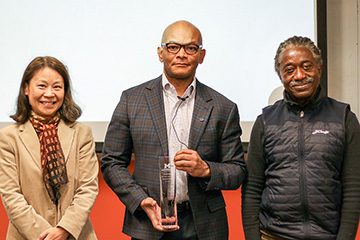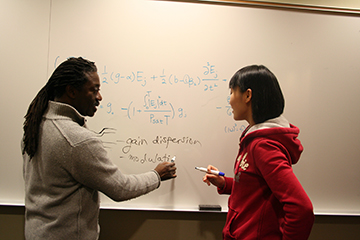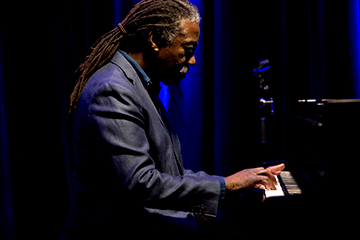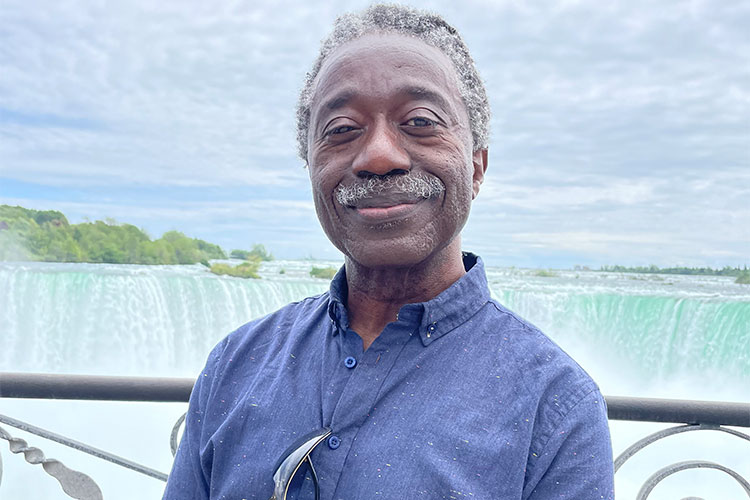
Herbert Winful in front of Niagara Falls, NY, USA, while attending the Photonics North conference. [Image: Courtesy of H. Winful]
Editor’s note: In an upcoming feature article in its May 2023 issue, “Breaking Barriers, Advancing Optics,” Optics & Photonics News profiles six Black scientists in the United States, their pathbreaking work in optics, photonics and related areas, and their perspectives on progress and challenges for underrepresented groups in science. In this special accompanying online “Conversations” series, we offer edited versions of the interviews behind those profiles.
In this installment, OPN chats with Optica Fellow Herbert Winful, Joseph E. and Ann P. Rowe Professor of Electrical Engineering and Arthur F. Thurnau Professor at the University of Michigan, USA.
You’ve spent your career in the United States, but you grew up in Ghana. How do you feel your youth there may have helped to shape your later career?
Herbert Winful: Ghana was a British colony until it became independent in 1957. As a result, we followed the British system of education. We went to elementary and middle school; then, around the age of maybe 11, we started secondary school. About five years after that, you’d take these exams called the general certificate of education, ordinary level—O-level exams. If you did well, you could go on to a further two years of “sixth form,” and then take the advanced-level exams. If you did well, you would go on to university.
So I went through that system. And my school happened to be a Catholic boarding school, as many high schools in Ghana are. It wasn’t an elitist thing to go to a boarding school—it was just the thing, you know? Because when the missionaries came to West Africa, I guess they didn’t want the kids to be running away home. And I guess it was also to indoctrinate them in that “safe space.”
“I got a wonderful education in Ghana … In high school, we used some of the same textbooks that I found were in use when I came to the US and I started my college education.”
I had some really great teachers—Ghanian teachers, as well as American teachers from the Peace Corps and the Brothers of the Holy Cross, Canadian and British teachers, even a Russian or two. There was a veritable United Nations of teachers, and I learned a lot from them.
So I think I got a wonderful education in Ghana. You know, in high school, we used some of the same textbooks that I found were in use when I came to the US and I started my college education. I had excellent education in physics, chemistry, math, English; I took French. So I think my education in Ghana really, really helped me.
I understand you also had a personal encounter with the US–Soviet “space race” that was going on at the time.
Yes. When I was in middle school, the Soviets had sent a woman to space, Valentina Tereshkova. After that, she went on a world tour, and she came to Ghana and happened to visit my little school in Cape Coast, Ghana. And I was selected by the head teacher to meet Valentina Tereshkova and present her with flowers. I got excited about space travel, about the wonders [of space]; I also followed, of course, the American space travelers.
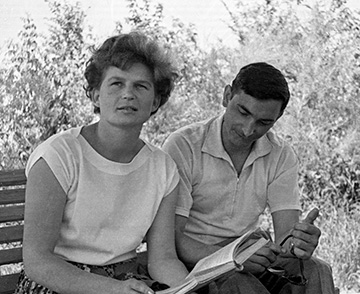
Valentina Tereshkova (left) and fellow Soviet cosmonaut Valery Bykovsky, a few weeks before the June 1963 launch of Vostok 6, the mission that made Tereshkova the first woman in space. [Image: RIA Novosti archive / Wikimedia Commons, CC-SA 3.0]
And I was also interested in science, I was interested in engineering. My father was a civil engineer; he was one of the lead engineers on Ghana’s Volta River Dam, the hydroelectric project that provided electricity to Ghana as well as a couple of neighboring nations. He would take me out there sometimes see the construction. And you’d say, “Wow, this engineering thing is really something great, something that will help humanity.”
So I think my destiny was pretty much set. I knew I wanted to be a scientist, I wanted to be an engineer. And then later, I also figured I wanted to go to the United States.
And why was that?
Well, partly because of the educational opportunities. But also, I think, because I wanted to broaden my horizons. Where I grew up, Cape Coast, was a very nice town, but a small one; I think the population then was about 60,000. I felt I needed to escape—to experience the world.
Let’s talk a little bit about that experience, starting with your university education. Unlike some of the people we’re talking with for this feature, your education was at predominantly white institutions. What was the experience of attending those institutions like, after having grown up in Ghana?
When I came to the States in the fall of 1971, I started out at Lehigh University in Bethlehem, Pennsylvania. That was because an uncle of mine had visited Lehigh, and he came back and told me great stories about it as an engineering school for undergrads. I also thought about MIT, but at the time, I thought MIT was just for nerds. [Laughs] I thought I wanted something a bit different.
“When I came to the States in the fall of 1971, I started out at Lehigh University in Bethlehem, Pennsylvania … I also thought about MIT, but at the time, I thought MIT was just for nerds.”
So I went to Lehigh. I stayed with a host family, a white American host family, in a small town called Bath, which is about three miles from Bethlehem. And one day I was walking down the street with the kids of that family. And I heard some people yelling “Puerto Rican, go home! Puerto Rican, go home!” at me.
And the kids of the family said, “Oh, Herb, don’t pay them any attention.” But I was a bit mystified initially by this, because I’m not Puerto Rican. And then I realized: Okay, they didn’t want to see a person of color in their community—it’s a very white place. And they were shouting “Puerto Rican” because in Bethlehem, the largest minority group was likely Puerto Ricans. So that was my first encounter with something that seemed a bit awry.
And then I started taking my classes at Lehigh. And in an English course, my professor kept giving me C’s on papers that I had written. I was bothered by it, because I knew that my English was very, very good—I had gotten the highest grades in English in high school; I read voraciously. One of my Peace Corps teachers held up my writing as a model in high school.
So I wondered why I was getting these C’s. And I decided, maybe I need to move to a different English class. So I moved to a higher-level English class, and in that class the professor actually recognized my writing ability. From that point on, I got nothing but A’s in those English classes.
So I think that the first professor probably had some preconceived notion. And it was then that I thought, Okay, I should be more mindful of my surroundings. Because growing up in Ghana, I hadn’t encountered any such thing.
But, after that initial bit of unpleasantness, everything was fine. There weren’t that many Black students at Lehigh, but I didn’t feel out of place. I made friends; I did well in my courses, everything.
And then you transferred to MIT—the place you’d thought was “just for nerds”—after that first year?
Yes. And I found a significant number of African students at MIT. So there was companionship, there was community. And there was also a Black Students’ Union, and I became part of that and got involved in tutoring there.
I actually felt quite at home being in that environment. I didn’t feel anything that I would consider racist. I felt that I could approach all my professors. I felt valued. I enjoyed the interactions with students of all races, with my professors. I really had a great experience at MIT.
Now, MIT is in Cambridge, just across the river from Boston. And people used to say, “Oh, you shouldn’t go to South Boston, because they don’t like to see Black people there.” So if I happened to be wandering around Boston and I got anywhere close to South Boston, I’d turn around and head back the other way.
But I also experienced the kindness of strangers, you know? One winter … I had gone some distance away from the campus, and I thought I would take the bus back. But it turned out the bus wasn’t running, as there was a snowstorm. And I thought, “I’m going to have to walk through the snowstorm all the way back to the campus.” Well, as I was walking, a car stopped, and this white guy in a fancy car says, “Hop in; where are you going? I’ll give you a ride.”
I was so touched by that act of kindness. He didn’t have to do that. I was just some young Black guy walking in the snowstorm, and he stops and picks me up.
What about your academic experience at MIT? What sort of things came out of that?
My educational experience at MIT was formative. It was as a sophomore at MIT that I met Hermann Haus, who became my undergraduate advisor. He was one of the great luminaries of lasers and quantum electronics.
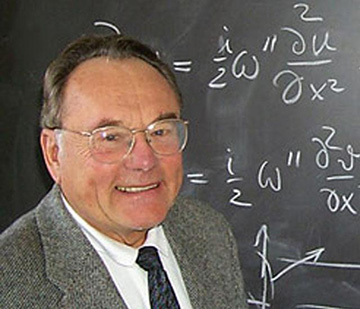
Hermann A. Haus. [Image: MIT]
So I asked him one day, when I was a sophomore, “Professor Haus, can I work in your lab?” And he said, “Okay, but after you take my course.” So I took his course on lasers, and the very next semester, I ended up working in his lab, on CO2 lasers. And that really was my first introduction to lasers, to quantum electronics.
And he was an amazing mentor. Even after I left MIT, he would check in on me to see how things were going—even after I became a professor. Anytime I won an award or something, he would be the first to email me, to write and congratulate me.
You went to the University of Southern California, though, for your Ph.D. How did that come about?
In my junior year, in the summer, I went to a Yale University [internship] for undergrads, and I worked under Professor Richard Chang, doing experiments in nonlinear optics. And it was during that experience that I learned about USC, where there were all these great people in nonlinear optics, like Robert Hellwarth, Jack Marburger, Bill Louisell—a ton of people. And, of course, Elsa Garmire.
So I went on to USC and that’s where I did my Ph.D. And it was there that I got some ideas and attention. I had an idea about nonlinear periodic structures that led to one of my most-cited papers to date, and actually started the whole field of nonlinear periodic structures.
How was the environment there in other ways?
Well, unfortunately, I did experience constant harassment from the campus police at USC. They would regularly stop me and ask me for ID to prove that I was a student. Finally, after the nth time, I refused to show the ID, and they wrestled me to the ground, handcuffed me behind my back and took me to the campus police station.
I would ask my white friends if they’d ever been stopped by the campus police, and they were amazed to learn that such things actually happened on campus. I guess that was one of the hazards of “trying to get a Ph.D. while Black”!
After earning your Ph.D., you spent some time at GTE Labs.
Yes. When I was finishing my Ph.D. back in 1980, I gave a talk at a conference—I think it was IQEC, the International Quantum Electronics Conference, which was in Boston that year. And it turned out that in the audience was a manager from GTE Labs, and he ended up calling my advisor at USC, Elsa Garmire, to ask about me.
And before I knew it, I was being invited to interview at GTE Labs. It turned out that they were starting a group in nonlinear optics, and they wanted to have a theorist, which I was at the time, to kind of guide the effort. So they made me an offer and I jumped at it.
“GTE Labs was really great. It was like Bell Labs; there was a lot of freedom to follow your interests.”
I worked in what was called the Fundamental Research Lab, which was designed to look at long-range research—stuff that wouldn’t be employed practically for maybe another 20 years … If I had an idea for anything, so long as it was in optics and had something vaguely to do with fibers or lasers, I was encouraged to do it. And we were encouraged and actually required to publish.
So GTE Labs was really great. It was like Bell Labs; there was a lot of freedom to follow your interests. And I collaborated with others working in the lab, and being close to MIT I could go to seminars there.
After that experience, you took a position at the University of Michigan, where I think you’ve been for 35 years …
It’s 36 years now.
That does suggest it’s a good fit for you. Is there anything about this institution that you have found particularly worthwhile?
Well, the University of Michigan is a huge university. It has excellent departments in everything—from electrical engineering to medicine to law. So there’s the opportunity to interact with a broad spectrum of people.
Herbert Winful (right) with former student Donnell Walton (center) of Corning Inc. and University of Michigan electrical and computer engineering (ECE) chair Mingyan Liu. The occasion was Walton’s receipt of the ECE Willie Hobbs Moore Distinguished Alumni Lectureship. [Image: Courtesy of H. Winful] [Enlarge image]
And I have discovered along the way that to flourish at a place like this, you have to actually love your students. You have to make the growth of students a priority. And that’s something that I took from my interactions with Hermann Haus as an undergrad at MIT.
So I made it my duty to really mentor students, to teach them well. Research is important, but I wanted to really establish a connection with students from the beginning. And in my second semester there, I was voted the best teacher, best professor in the department. And the students asked me to be the faculty advisor to Eta Kappa Nu, the electrical engineering honor society.
So, right away, I was engaged in the community. I also started out with some very good graduate students, and started out developing new areas, looking at things like arrays of semiconductor lasers, and the nonlinear dynamics that can lead to instability and chaos in lasers. We proposed a concept of synchronized chaos, which became a fairly big deal.
So I got involved in both the mentoring of particular students, and the production of research that became impactful. And the university rewarded me. Within my first four years, I was already an Arthur F. Thurnau Professor, which is a named professorship given to the best teachers at the university. And my colleagues were very good to me—they would nominate me for things such as that … and to serve on various committees.
Of course that takes a lot of your time. But I feel that we all need to do something to help our department, our university prosper, and to help our students grow. So I’ve found myself being pulled into many, many, many such things. And the university being so big and so broad, there’s so much you can do.
What are some specific examples of what you can do?
Well, during the height of the pandemic, after the George Floyd murder, I proposed that we establish a Juneteenth celebration in the department. I don’t know if you’re familiar with Juneteenth—it’s a national holiday now in the US, but back in 2020, few people had heard about it. I proposed that we have a Juneteenth celebration. It would create community, it would create solidarity with Black students at this really stressful time.
And the response was tremendous. This was a virtual celebration, on Zoom, and there were over 300 attendees that showed up for this. Now it’s become a tradition—every year we have this Juneteenth celebration.
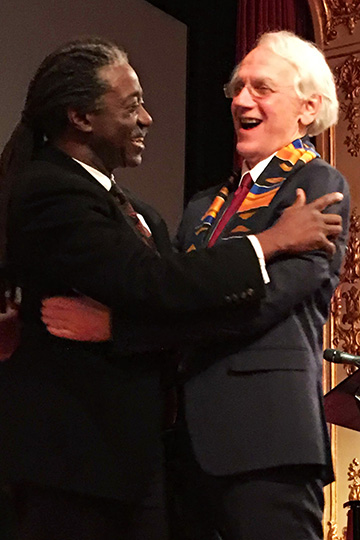
Herbert Winful with Gérard Mourou at a 2018 celebration of the Nobel Prize in Physics for Mourou and colleague Donna Strickland. [Image: Courtesy of H. Winful]
Another example: Shortly after I came to Michigan, the university hired Gérard Mourou from the University of Rochester. He came to Michigan with something like 13 of his graduate students, postdocs and even his administrative assistant. When he came, he led an effort [in which] we wrote a proposal to establish the Center for Ultrafast Optical Science, which is an NSF Science and Technology Center. That began a very long friendship with Gérard Mourou, who went on to win the Nobel Prize in Physics in 2018.
The Center for Ultrafast Optical Science really put Michigan on the map in ultrafast optics. And I served as an associate director of the center, with responsibility for education and outreach. It impacted a lot of students, many of whom were minority students who went on to get Ph.D.s in optics-related areas, and some of whom are now faculty elsewhere.
Perhaps we could talk more generally about the experience of Black physicists and physicists from other underrepresented communities. You have a wealth of experience—what, from your perspective, are the most effective ways are for supporting students from underrepresented communities who are trying to walk this path?
Well, it’s good to try to create community. Oftentimes, these students maybe the only Black person in a class or in a research group. So it’s important to try to create connections, find others—if not necessarily other Black students, maybe people who could be allies.
I have been the faculty advisor to the Graduate Society of Black Engineers and Scientists [at Michigan] for more than 20 years. For students in my department of electrical engineering, where there are maybe just a few Black students, this organization draws from Black students from all over campus. It creates a larger ecosystem, in which they can feel the support of this community. And it’s amazing—when a Black student in engineering defends their thesis, the entire Black community on campus shows up to support them. That’s a wonderful thing.
I also have ended up being an “unofficial” advisor to many minority students. So in addition to their official advisor, who most likely is not Black, they reach out and I can provide another layer of support. It’s not necessarily technical, but they feel comfortable coming to share their concerns, to ask for advice.
“It’s about ‘being there’ for them. It is what we call the ‘minority tax’; if you’re a person of color, you end up doing a lot more of this outreach and mentoring and community building. But it’s something that comes with the territory, and it’s something that I feel we must do.”
So it’s about “being there” for them. It is what we call the “minority tax”; if you’re a person of color, you end up doing a lot more of this outreach and mentoring and community building. But it’s something that comes with the territory, and it’s something that I feel we must do.
And I’m beginning to see [the impacts]. You know, when I first started out in this field, I would go to a conference, and I might see maybe one or two other Black people there. But it’s changing now—when I go to a conference, I don’t just see Anthony Johnson or Peter Delfyett; I see people that I’ve never met before. And that’s always wonderful.
You talked about the level of effort you’ve undertaken in such outreach and mentoring—I’m curious if you think there’s space for work to be done on the part of white advisors who work with students from traditionally underrepresented communities.
Yes, yes. I think everyone should make an effort to try to understand where students of color, underrepresented minority students, are coming from—try to understand their experiences; try to understand what they face; try to understand concepts like micro-aggressions and things like stereotype threat … And I think it behooves white advisors to try to come up to speed on these types of things, so that they can understand what their students face.
Herbert Winful with graduate student Tsai-Wei Wu. [Image: C. June / Courtesy of H. Winful] [Enlarge image]
At the University of Michigan, we have this thing called the MORE committee—it stands for Mentoring Others Results in Excellence. And they provide workshops for faculty on mentoring. They have sessions where professors and their students come together to the workshop and they develop a mentoring plan. But some of their workshops are focused on what’s called “mentoring across difference,” in that often the mentor will be mentoring someone who’s not at all like them in terms of ethnicity, economic background, religion, whatever.
So I think that white mentors should avail themselves of any opportunity to educate themselves on whatever specific issues might be confronting the students of color that they’re mentoring.
I’d like to return for a moment to Ghana and the African continent in general. You have been involved in a number of efforts there, such as helping to build the laser and fiber optic center at the University of Cape Coast. Could you talk about your current connection to science in Africa and about the importance of building science efforts on African soil?
Well, science is terribly underfunded in places like Ghana … The funding does not exist, and there isn’t much connection between the science activity and industry. There is fiber optics in Ghana; your messages do go through fibers in Ghana. In fact, at the OFC conference this year, one of the keynote speakers was Patricia Obo-Nai, the CEO of Vodaphone Ghana.
But I haven’t seen that the researchers at the university are connected to the industry in any significant way—something that could bring resources and practical problems to work on for scientists and engineers at the university. If they wait for the government to give them funding, it’ll be a pretty long wait. The government doesn’t have the resources. But if you can make more connections to industry, there will be greater chances for survival and progress.
I was actually back in Ghana in November and December, and I brought with me Gérard Mourou, the Nobel Prize winner; he had always wanted to visit Ghana. And he was able to give an address to the Ghana Academy of Arts and Sciences, which hopefully could prod people to maybe lobby for more funding for science in Ghana.
From Ghana, we went on to Dakar, Senegal, for a conference of the African Materials Research Society. That society had scraped up funding from the US and other places to put on this conference, and I think they’re also funding some young scientists in that area. So I think it requires bringing together the effort from various countries to try to establish things like these cross-border centers, because no one country has the resources to do it on their own. And to try to push forward science and engineering research, the industrial connection and international collaborations are important.
I can’t resist the opportunity to ask you about your music, which I think you’ve said is the thing that gives you the most joy aside from your work. How do you view the connection, if there is any, between your music and your work?
Well, my music keeps me sane, and I need to be sane to do my work, you know? [Laughs]
Herbert Winful at the piano. [Image: C. June / Courtesy of H. Winful] [Enlarge image]
I mean, it just speaks to my soul. One can make some kind of “music is mathematical” argument—the intervals, the vibrations and such things. But I don’t approach it this way. To me, music has always been an essential part of my life. Growing up in Ghana, my grandfather, Charles Emmanuel Graves, who I never met, was a great composer in the Western tradition. A couple years ago, I had one of his pieces, “An Evening Calm,” performed here on campus—the university carillonist adapted it, and one wonderful winter day it was played on the university’s carillon. Everyone on campus could hear my grandfather’s music being played. That was such a touching moment.
So I just enjoy music because it is, I guess, in my DNA. And I had uncles who really encouraged my interest in music. And whenever I have time, these days, I will sit down and tickle the ivories. It helps center me; it helps reduce stress. And it also sometimes brings joy to students. We have a place called Pierpont Commons, where there’s a grand piano in the lobby. And as students and faculty and people are walking to get their lunch, sometimes I may sit there at the piano and play.
I think it’s something that helps to reduce stress—music being created in the midst of the hectic bustle of your research, teaching, running back and forth. You need time to de-stress a bit, and music really does that. It helps me, I think, be more centered when I’m doing my science.

